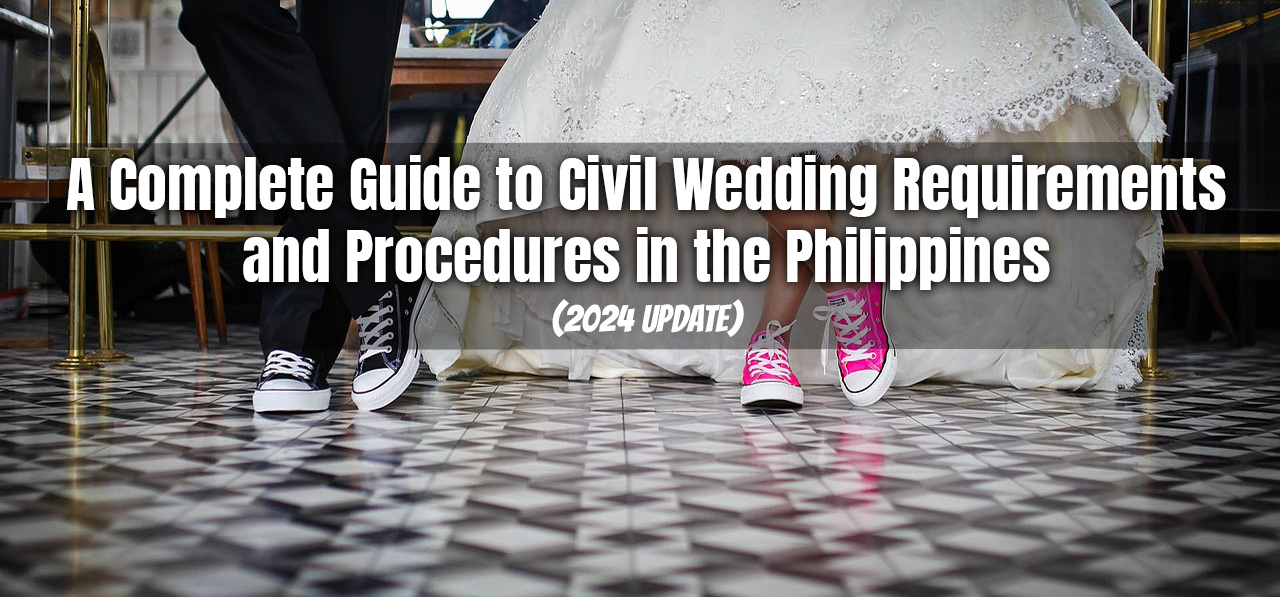
In the Philippines, civil weddings have become a popular option for couples seeking a simpler, more affordable path to legal marriage. Unlike traditional church weddings, civil ceremonies (civil wedding) are secular, offering flexibility in terms of venues, officiants, and costs. Civil weddings are legally recognized both within the country and abroad, making them ideal for couples from different religious backgrounds, foreigners marrying Filipinos, or those preferring a streamlined event.
Choosing a civil wedding doesn’t mean sacrificing the significance of the occasion. Many couples still personalize their ceremonies to reflect their values and beliefs. Civil weddings can take place in City Halls, private venues, or even open outdoor spaces, as long as they’re officiated by an authorized public official. This makes the ceremony highly adaptable to each couple’s preferences.
Additionally, civil weddings in the Philippines are accessible to a broad range of couples, including those seeking second marriages after a previous union ended by annulment or death. The requirements are clear, and the process is relatively quick, but it’s important to follow the correct steps and ensure that all documents are ready to avoid delays.
With the availability of online services like PSA Serbilis for requesting essential documents and embassies providing support for foreign nationals, couples can navigate the legal requirements smoothly. Whether you’re a local resident or an international couple, understanding these steps ensures that your civil wedding will be conducted without a hitch, allowing you to focus on celebrating your marriage.
General Requirements
1. Valid IDs
Both parties must present at least two government-issued identification documents, such as a passport, driver’s license, or voter’s ID. These are necessary to confirm your identity and nationality.
2. PSA Birth Certificate
A copy of your Philippine Statistics Authority (PSA) birth certificate is required to verify your age and birth details. You can request a copy online through PSA Serbilis, saving time and effort.
3. Certificate of No Marriage (CENOMAR)
This document certifies that you are not currently married. A CENOMAR can also be obtained via the PSA online platform, which ensures that you’re free to marry. This is particularly important for individuals who have never been married or have undergone an annulment.
4. Marriage License Application
Couples need to apply for a marriage license at the Local Civil Registrar’s Office (LCRO) where one of them resides. The license is typically released after a 10-day waiting period and is valid for 120 days. You’ll need to present your completed forms, valid IDs, and other supporting documents.
5. Community Tax Certificate (Cedula) and Barangay Certificate
A Community Tax Certificate (Cedula) and Barangay Certificate are required to prove residency. The cedula can be obtained at the City or Municipal Treasurer’s Office, while the Barangay Certificate is issued by the Barangay Hall where you live.
Additional Requirements
1. Parental Consent and Advice
If one or both parties are between the ages of 18 and 21, a Parental Consent is mandatory, while those aged 22 to 24 must present Parental Advice. These can be signed and notarized at your local civil registrar’s office.
2. Death Certificate or Annulment Papers
If either party has been previously married, additional documents are required. Widows or widowers must present a Death Certificate of the deceased spouse, while individuals who have undergone an annulment need to submit their Annulment Decree to prove the dissolution of their prior marriage.
Special Requirements for Foreigners
For foreign nationals marrying in the Philippines, specific additional requirements include a Certificate of Legal Capacity to Marry issued by the foreigner’s embassy or consulate. U.S. citizens can acquire an Affidavit in Lieu of a Certificate at the U.S. Embassy in Manila. This document states that there are no legal impediments to the marriage in their home country. It’s important to consult your respective embassy for specific procedures and requirements.
Procedure for Obtaining a Marriage License
The first step in getting married in the Philippines is to secure a marriage license. Here’s a breakdown of the process:
- Where to Apply
Both parties must apply for the marriage license at the Local Civil Registrar in the city or municipality where one of the parties resides. Some cities offer online application services, though this is not widespread. - Required Forms and Fees
You will need to fill out an application form and pay a processing fee that typically ranges from ₱100 to ₱300, depending on the locality. Bring all required documents (PSA Birth Certificate, valid IDs, CENOMAR, etc.) to avoid delays. - Waiting Period and Validity
After submission, there is a mandatory 10-day waiting period before the license is issued. The license is valid for 120 days and can be used anywhere in the Philippines. Keep in mind that a civil wedding cannot proceed without this license.
Civil Wedding Ceremony
1. Venue Options
Civil weddings are usually held in City Halls or Municipal Halls. However, couples may choose to have the ceremony at a private venue with the proper authorization from a judge or mayor.
2. Authorized Officiants
A civil wedding must be officiated by an authorized public official such as a judge, mayor, or any other official granted authority by law. It’s best to check with your local government unit for available officiants.
3. Estimated Costs
Civil wedding fees are generally lower than those of church weddings. Fees for the officiant and other ceremonial services range from ₱3,000 to ₱5,000, depending on the city or municipality.
Post-Ceremony Considerations
1. Registration of Marriage
After the ceremony, the marriage must be registered with the Local Civil Registrar’s Office. The officiant is responsible for submitting the marriage contract for registration. Couples will need to follow up on this to ensure the process is completed in a timely manner.
2. Obtaining the Marriage Certificate
Once the marriage is registered, you can request a certified copy of your Marriage Certificate from the Philippine Statistics Authority (PSA). This document will be essential for legal purposes, such as changing your marital status or applying for benefits.
Frequently Asked Questions (FAQs) About Civil Weddings in the Philippines
1. How long does it take to process a marriage license?
It typically takes 10 days to process a marriage license after submitting the application. This waiting period is mandatory as per Philippine law. Couples are advised to apply well in advance of their desired wedding date. The license is valid for 120 days from issuance and can be used anywhere in the country.
2. What is the cost of a civil wedding in the Philippines?
Civil wedding costs vary by location but generally range from ₱3,000 to ₱5,000. This includes officiant fees, venue use, and document processing fees. Some cities or municipalities may charge additional fees for optional services, like scheduling an off-site wedding with the judge or mayor.
3. Can foreigners marry Filipinos in a civil wedding?
Yes, foreigners can marry Filipinos in a civil wedding, but they must provide additional documentation. This includes a Certificate of Legal Capacity to Marry from their embassy or consulate, which affirms that they are legally free to marry. U.S. citizens, for example, must secure an Affidavit in Lieu of a Certificate from the U.S. Embassy in Manila.
4. What is the difference between Parental Consent and Parental Advice?
- Parental Consent: Required if either party is between 18 and 21 years old. It must be signed by a parent or guardian.
- Parental Advice: Required for individuals aged 22 to 24. While not as binding as consent, it must still be obtained, and the absence of advice may delay the release of the marriage license by three months.
5. Is there a dress code for civil weddings?
There is no strict dress code for civil weddings, but it’s generally expected to dress appropriately for the formality of the occasion. Many couples choose semi-formal or formal attire, although it can be as simple or as elaborate as the couple desires.
6. Can we choose our own officiant for a civil wedding?
Yes, couples can choose their officiant, but it must be a person authorized by law to conduct civil weddings, such as a judge, mayor, or a member of the clergy with civil authority. Some judges or mayors may also offer to officiate at private venues with prior arrangement.
7. How can we obtain a copy of our marriage certificate?
After the wedding, the marriage must be registered with the Local Civil Registrar. Once processed, you can request a certified copy of your Marriage Certificate from the Philippine Statistics Authority (PSA). Processing typically takes a few weeks, but online services can expedite the request.
8. Can we have a civil wedding outside of City Hall?
Yes, you can have a civil wedding outside of City Hall, such as at a private venue, but you need approval from an authorized officiant (e.g., judge or mayor). You may need to cover additional fees for the officiant to travel to your desired location.
These FAQs help clarify some common questions about civil weddings, but for a deeper dive, you may visit resources like Nuptials.ph and PSA Serbilis.
Conclusion
Navigating the civil wedding process in the Philippines can be smooth and manageable when you are well-prepared. Civil weddings offer a streamlined, budget-friendly option for couples who wish to marry without the formality and higher costs associated with traditional religious ceremonies. They also provide legal recognition both locally and internationally, which is especially important for foreign nationals marrying Filipino citizens.
The key to a successful civil wedding is planning. Ensuring that all required documents—such as birth certificates, CENOMARs, and marriage licenses—are secured well in advance will help avoid last-minute delays. It’s also important to verify if any additional documents, like parental consent or legal capacity affidavits for foreigners, are required for your situation. For non-Filipino citizens, close coordination with embassies and local civil registrars is crucial to avoid any legal complications.
After the ceremony, ensuring that your marriage is duly registered with the Local Civil Registrar is essential. The final marriage certificate, issued by the Philippine Statistics Authority (PSA), will serve as official proof of your marriage. This certificate can be requested online for convenience, ensuring that your legal documents are in order for any future legal purposes such as changing your civil status or applying for spousal benefits.
Civil weddings also give couples the freedom to personalize their ceremony without being bound by religious conventions, making them a flexible and inclusive option. Whether you’re planning a small ceremony at the local City Hall or choosing a more intimate private venue, a civil wedding can be just as meaningful and memorable.
Ultimately, understanding the steps and legal requirements allows you to focus more on celebrating this momentous life event and less on the administrative details. By following the guidelines outlined in this guide and referring to reliable resources such as PSA Serbilis and embassy services, you can ensure that your civil wedding is a stress-free and joyful experience.
Related Articles:
– Married Life 101: Tips for Getting Ready for Your Wedding Drill and Beyond
– Ultimate Guide To Planning Your Dream Wedding
– Fresh and Innovative Wedding Ideas for Your Celebration
– The Most Popular Wedding Flowers and Their Meanings
– The Best Wedding Guest Dresses for Dancing the Night Away

